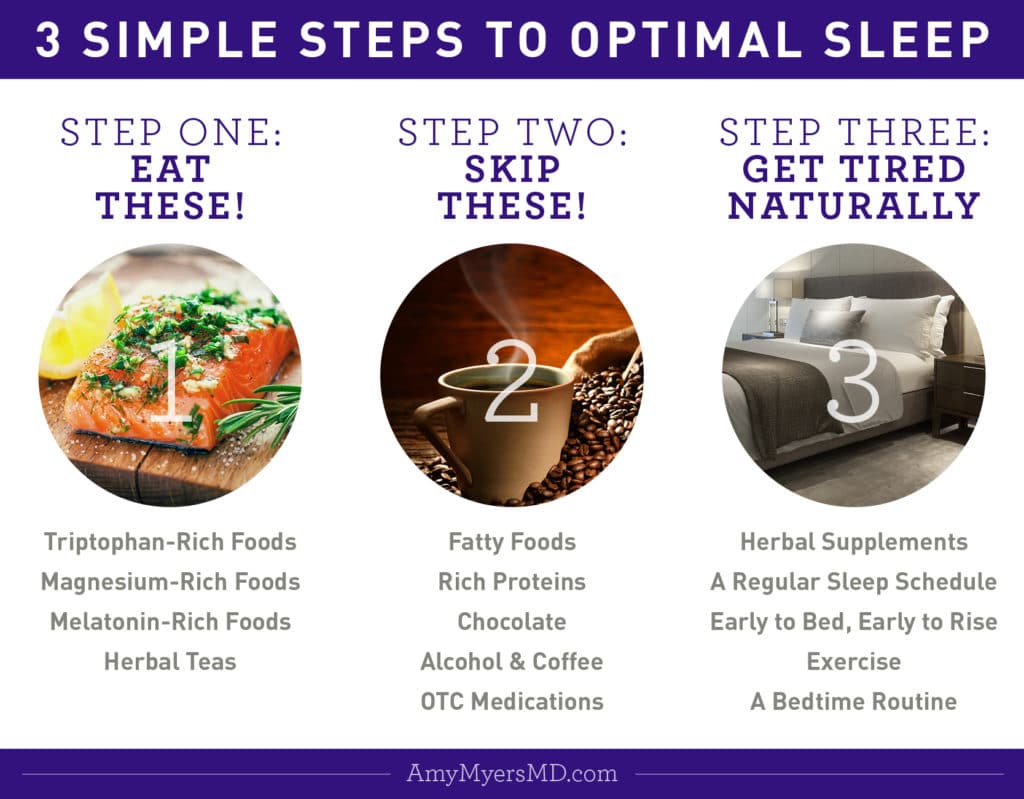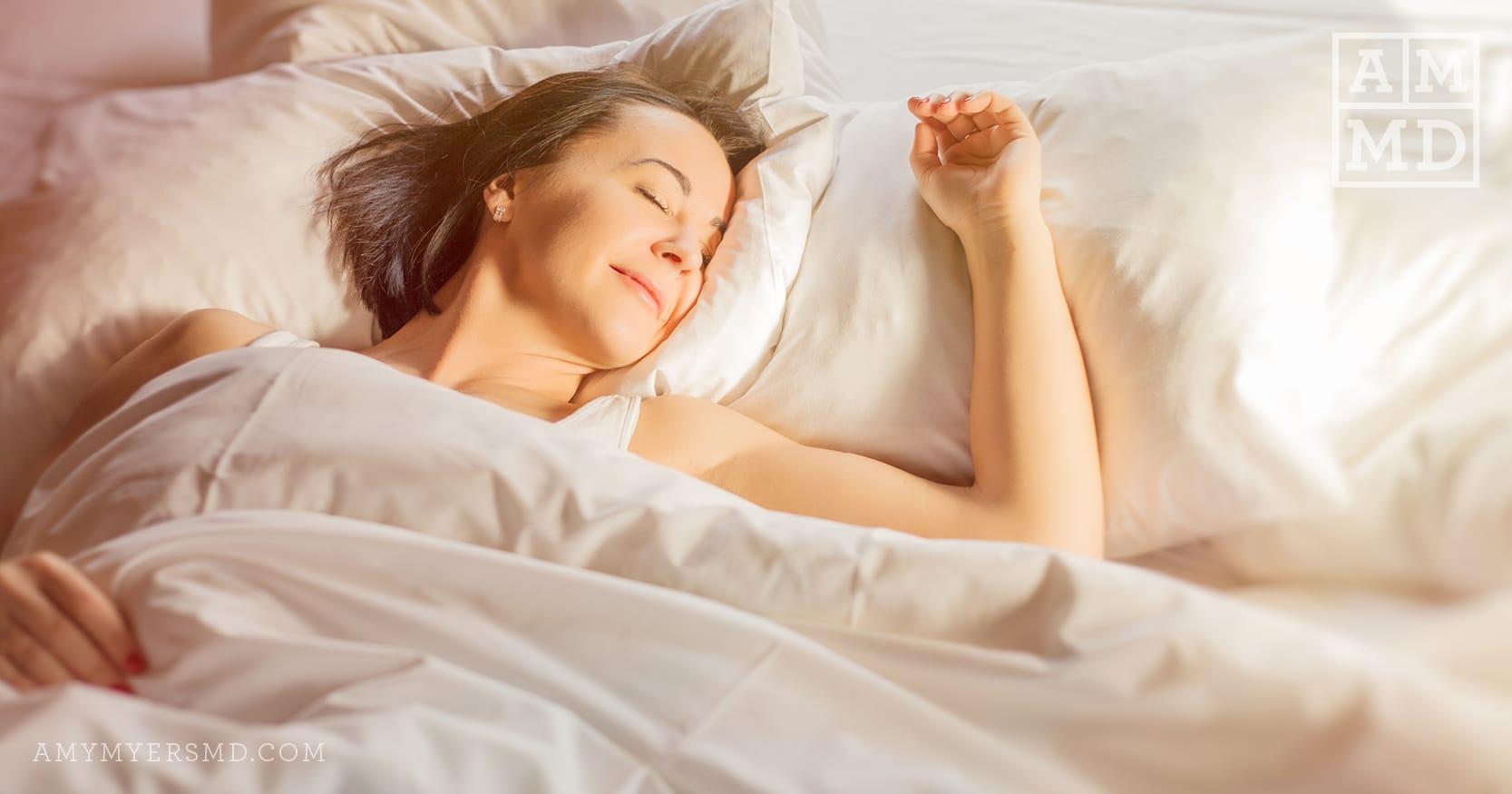Your life and your health can change dramatically when you get enough quality sleep. In fact, the benefits of optimal sleep are so far-reaching that you’ll be amazed by how much restful, restorative sleep can change your world. If you’re anything like the average American, you’re sleeping around ninety minutes less than you would if you were alive 100 years ago.1 My guess is that you’re spending around 6.8 hours asleep each night2 or even less. You are probably sleep deprived on a regular basis.
You may have heard the words “Sleep hygiene.” This is a real thing! And it isn’t just about getting enough hours. It’s also about improving everything about your sleep and the factors that can affect it, from when you fall asleep to what you eat.
Benefits Of Optimal Sleep
So what are the benefits of a good night’s sleep? Studies show that quality sleep can make you eat more healthfully. One study showed that people on a diet that contained lots of fiber slept more deeply and had a better-quality night’s rest than those who ate less fiber.3 Balanced meals that contain a variety of ingredients have also been seen to improve sleep efficiency.4 There is other evidence to suggest that foods such as fatty fish and kiwifruit can positively affect sleep.5
Optimal Sleep Helps Avoid Heart Disease, Pre-Diabetes
Sleeping well can also lower your risk for diabetes and heart disease. In a study of post-menopausal women, good sleep quality was associated with a reduced risk for cardiovascular diseases. People who sleep between 7 and 8 hours per night have a 251% less chance of developing pre-diabetes compared to those who sleep less than five hours per night. Interestingly, the people in the 7-8 hour range also have 79% less chance of developing the disease than those who sleep more than nine hours per night.6 As I’ve often said, too much of a good thing is just too much!
Optimal Sleep & Improved Mood
Another benefit of getting optimal sleep is that it can reduce stress and improve your mood. Have you ever noticed that when you don’t get enough rest, you’re grouchy, anxious, angry or just react more strongly to negative situations? This is because sleep deprivation directly affects a part of your brain called the amygdala, which is responsible for emotions.7 It also causes you to go into fight-or-flight mode more easily.8 Having a healthy sleep schedule, on the other hand, can help temper emotional distress, as well as benefit you physically.9
One of the reasons for this is that when you’re in control of your emotions, you’re more likely to assess a particular situation and respond appropriately. Even a nap can put your brain back in balance if your body is allowed to go into a REM sleep state.10 A good rest can also boost your mood.11 A three-week study on teenagers showed that teens felt more angry and irritable when they didn’t sleep well.12 Couples experienced more conflict when sleep deprived in a laboratory setting.13
Optimal Sleep & Brain Health
Did you also know that restful, quality optimal sleep can improve your memory and help you think more clearly? Studies show that sleep plays a very important role in making short-term memories into long-term ones, as well as improving your ability to accurately recall events.14,15
Hoping to get a promotion soon? A sound night’s sleep could help you get it! Your competition’s trouble sleeping could lower their work performance.16
Steps For Achieving Optimal Sleep
So what are my top tips for a restorative night’s rest? Get comfy and read on!
 Dr. Amy Myers
April 7th, 2019
https://content.amymyersmd.com/article/optimal-sleep/3 Simple Steps To optimal Sleep – Infographic – Amy Myers MD®
Dr. Amy Myers
April 7th, 2019
https://content.amymyersmd.com/article/optimal-sleep/3 Simple Steps To optimal Sleep – Infographic – Amy Myers MD®1. For Optimal Sleep, Eat These!
-
Tryptophan-rich Foods
Tryptophan is an amino acid and an essential nutrient. It has a calming effect on you because your body turns it into a B vitamin called niacin. Niacin plays a key role in creating serotonin, a neurotransmitter that’s associated with melatonin, a hormone that impacts your sleep-wake cycle.17The foods that contain tryptophan include chicken, turkey, fish, and shellfish. Lamb, pork, and game are also rich sources.
-
Magnesium-Rich Foods
Bananas, avocados, almonds, and green leafy vegetables contain lots of magnesium, which supports the production of GABA, another amino acid that travels between the cells in your nervous system, promoting relaxation and supporting sleep.18 My Magnesium Citrate supplement is perfect for supporting relaxation and easing muscle tension.
-
Melatonin-Rich Foods
As I mentioned, the hormone melatonin helps regulate your sleeping and waking cycles, among other tasks.19 Some foods actually contain melatonin, while others can raise the levels in your body naturally. They include:- Salmon
– Pork
– Cherries
– Grapes
– Radishes20 -
Herbal Teas
Drinking a cup of herbal tea before bed is a fantastic way to promote a restful night. It is thought that the herb chamomile contains an antioxidant called apigenin in abundance, which may help initiate sleep.21 Valerian root can also be beneficial because it’s believed to naturally raise GABA levels in the body.22 Passionflower is another herb worth exploring for its calming and sleep-promoting effects.23
-
A Nice Cup of L-Theanine
Many people find drinking a warm cup of tea to be soothing. And now we know why! Tea contains L-Theanine, a stress-reducing amino acid found primarily in the tea plant.24 Just make sure you don’t drink black or green tea after about 4 pm due to their caffeine content. Or, drink decaffeinated tea so less caffeine gets into your bloodstream. Decaffeinated tea still contains L-Theanine!
2. For Optimal Sleep, Skip These!
While drinking a relaxing cup of tea can calm you down and set up you for a wonderful night’s rest, other things you eat or drink can prevent you from getting a good night’s sleep.
-
Fatty Foods
Eating a lot of fat before bed can stop you from getting the rest you deserve because it is more difficult to digest than other substances.25 In fact, it can affect how deeply you sleep, whether you wake at night, and how quickly you can get to sleep.26
-
Rich Proteins
Heavy meals that include rich proteins can also block that good night’s rest.27 This is because they tax your digestive system, making you uncomfortable and leading to increased blood flow around that area.28
-
Chocolate
Chocolate stimulates your nervous and cardiovascular systems.29 Chocolate is best reserved for earlier in the day, ideally during the morning and early afternoon.
-
Alcohol and Coffee
Avoid alcohol and coffee if you really want to sleep well. While alcohol may allow you to fall asleep quickly and sleep deeply for a while, it reduces rapid eye movement sleep, or quality rest time.30 Limit your consumption of alcohol, and/or be sure to have it at least four hours before you want to sleep. Studies show that coffee should ideally be consumed six hours prior to bedtime to lessen its impact on your sleep.31
-
OTC Medications
Don’t forget to check out your over-the-counter remedies, too. Many contain stimulating, hidden caffeine and sugar, which do not promote sleep.
3. For Optimal Sleep, Get Tired Naturally
Now that we’ve got food and drinks out of the way, let’s talk about other things that will help you enjoy all the benefits of great sleep.
-
Herbal Supplements
My new Rest and Restore™ formula contains pharmaceutical-grade Magnesium Glycinate, GABA, and L-Theanine, a powerful triad for supporting a relaxed mood and a healthy sleep cycle. The combination of the elemental mineral, magnesium, and the amino acid, glycine, is a powerful ally in supporting a healthy night’s sleep. Magnesium can help stiff and tense muscles relax. Glycine can act as a neurotransmitter inhibitor in your brain, helping to support a calm and relaxed mood, a sense of well-being, and a healthy night’s sleep. Pharma GABA® has been shown to create a profound sense of physical relaxation so you can finally relax before bed. Finally, the L-Theanine in my Rest and Restore™ is sourced from decaffeinated green tea leaves.
-
A Regular Sleep Schedule
Studies show that a regular sleep schedule promotes sound sleep quality. Try setting an alarm to wake you up in the morning, as well as for bedtime. Go to bed and wake up at the same time every day, even on the weekend. This can also help reduce fatigue during the day.32 When you’re feeling sleepy at night, go to bed! Don’t finish watching that show or reading that chapter; pick it up again in the morning.
-
Early to Bed, Early to Rise
Explore rising early. This is what you would do in a completely natural environment. Research shows that doing this can increase your academic performance if you’re a student.33 It could also make you worry less, have a safer commute, make you more productive, and improve your social life.34 There’s practically no reason not to try this!
-
Exercise
Exercising early in the day boosts the body’s natural rhythms and prepares you for the day ahead.35 It also eventually makes you feel tired, making sleep more enjoyable and satisfying. However, if the evening is the only time you can squeeze in a workout, don’t skip it! Engage in light or moderate-intensity workouts that don’t increase your heart rate excessively. Give yourself time for a cool-down to help relax your body for sleep.36
-
Create Your Bedtime Routine
Having a soothing nighttime routine can clearly communicate to your body that it’s time for bed. Try taking a warm bath, lighting a few candles and lowering the lights, or some very gentle yoga or stretching exercises to wind down well.
Follow any —or, better yet, all—of these steps and I think you’ll find you get the best sleep you’ve had in years!
Article Sources
- https://www.nationalgeographic.com/magazine/2010/05/sleep/.
- https://news.gallup.com/poll/166553/less-recommended-amount-sleep.aspx.
- //jcsm.aasm.org/viewabstract.aspx?pid=30412.
- https://www.ncbi.nlm.nih.gov/pubmed/18681982.
- https://www.ncbi.nlm.nih.gov/pmc/articles/PMC5015038/.
- https://www.ncbi.nlm.nih.gov/pmc/articles/PMC5594540/.
- https://www.ncbi.nlm.nih.gov/pubmed/17956744.
- https://www.ncbi.nlm.nih.gov/pmc/articles/PMC5594540/.
- https://www.sonima.com/meditation/sleep-emotions/.
- //www.cell.com/current-biology/abstract/S0960-9822%2811%2901248-6.
- https://www.webmd.com/sleep-disorders/benefits-sleep-more#1.
- https://www.ncbi.nlm.nih.gov/pubmed/24889207.
- https://thoughtcatalog.files.wordpress.com/2015/02/57743-gordon26chen2014spps.pdf.
- //www.ncbi.nlm.nih.gov/pmc/articles/PMC3768102/.
- https://webfiles.uci.edu/eloftus/Frenda_SleepDep_PsychSci2014.pdf?uniq=-olqi49.
- https://www.ncbi.nlm.nih.gov/pmc/articles/PMC4610176/.
- https://www.sleep.org/articles/what-is-tryptophan/.
- https://www.verywellmind.com/what-is-gaba-3024566.
- https://www.medicinenet.com/script/main/art.asp?articlekey=11640.
- https://www.ncbi.nlm.nih.gov/pmc/articles/PMC5409706/.
- https://www.ncbi.nlm.nih.gov/pmc/articles/PMC2995283/.
- https://www.ncbi.nlm.nih.gov/pubmed/14742369.
- https://www.ncbi.nlm.nih.gov/pubmed/21294203.
- https://www.ncbi.nlm.nih.gov/pmc/articles/PMC4728665/.
- //jcsm.aasm.org/viewabstract.aspx?pid=28375.
- https://www.ncbi.nlm.nih.gov/pubmed/10095388.
- https://www.webmd.com/sleep-disorders/ss/slideshow-sleep-foods.
- https://www.ncbi.nlm.nih.gov/pubmed/10095388.
- https://www.foxnews.com/health/chocolate-the-love-drug-and-why-its-good-for-you.
- https://www.webmd.com/sleep-disorders/news/20130118/alcohol-sleep#1.
- //jcsm.aasm.org/viewabstract.aspx?pid=29198.
- https://www.ncbi.nlm.nih.gov/pmc/articles/PMC2718885/.
- https://www.researchgate.net/publication/26671781_Early_to_bed_early_to_rise_Sleep_habits_and_academic_performance_in_college_students.
- https://www.huffpost.com/entry/go-to-bed-early_n_7157026.
- //sciencenordic.com/exercise-morning-and-sleep-better-night.
- https://www.livestrong.com/article/292507-is-it-bad-to-work-out-at-night/.
